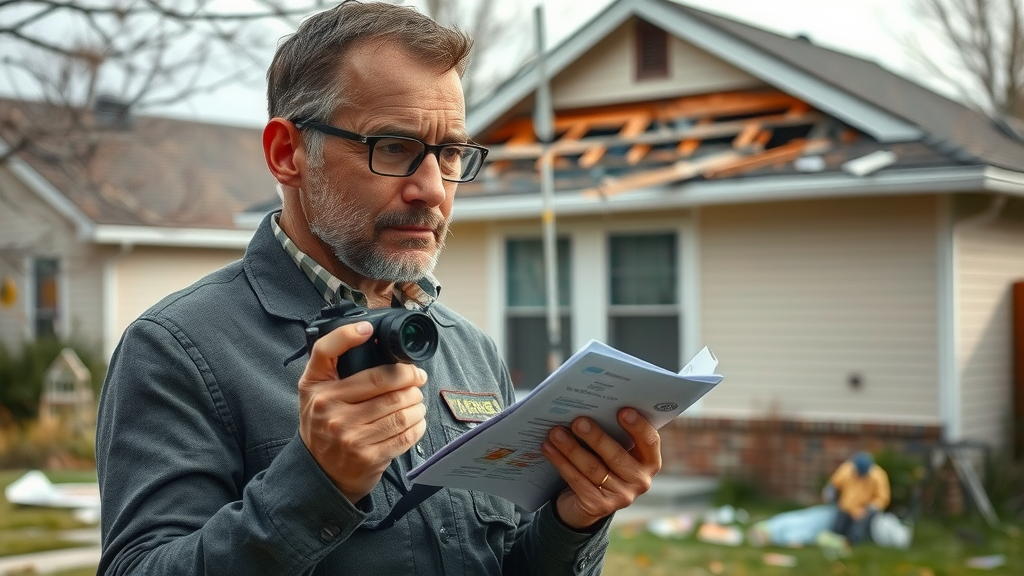Did you know that more than 60% of insurance claimants walk away with settlements less than half of their rightful value? When it comes to negotiating with insurance companies , many policyholders unknowingly make critical errors that drastically lower their compensation. If you’re seeking a fair settlement after a car accident, property damage, or personal injury , understanding the tactics and pitfalls of the negotiation process is essential. This guide will equip you with practical strategies, real-world insights, and proven approaches to ensure you receive the insurance settlement you truly deserve.
Why Negotiating with Insurance Companies Often Leads to Unintended Consequences
"A recent study revealed that over 60% of claimants received less than half of what they were entitled to simply because they misunderstood the claims process."
- The importance of understanding settlement negotiation basics when negotiating with insurance companies
- Frequent mistakes claimants make when negotiating with insurance companies
- Real-world examples of insurance settlement failures and successes
Most people approach negotiating with insurance companies with good intentions but minimal experience. Because insurance companies invest significant resources into their claims adjuster training, many claimants—particularly after a car accident or facing property damage—quickly become overwhelmed by technical jargon and procedural obstacles. Without a firm grasp of key settlement negotiation basics, such as evaluating the full extent of your damage and knowing your policy covers, you risk accepting a low offer or missing out on fair compensation altogether.
Real-world settlement negotiation examples reveal the bottom line: misunderstandings, incomplete documentation, or poorly timed responses can result in significant financial loss. For instance, one homeowner accepted the initial offer after a storm damaged their roof, only to discover later that the payout barely covered half of the necessary repairs. On the other hand, claimants who meticulously document property damage and persistently communicate with their insurance adjuster often secure settlements closer to the real actual cash value—or even more when negotiating with payers effectively. Understanding this dynamic is crucial before any negotiations begin, regardless if you're handling a property damage insurance claim or a personal injury claim.

Steps for Effective Negotiating with Insurance Companies in an Insurance Settlement
Proactively engaging in the negotiation process with well-documented claims and clear goals is essential to achieving a favorable insurance settlement. Below, you’ll find a structured approach for navigating everything from your first damage claim communication to finalizing your settlement amount. By understanding the insurance company’s incentives, gathering detailed evidence, and recording every discussion, you can dramatically improve your negotiation outcome—whether after a car accident, a personal injury, or significant property damage.
Understanding the Insurance Company’s Priorities in Insurance Settlement Negotiations
Each insurance company is a business, and its main goal during any settlement negotiation is to minimize payout while upholding contractual obligations. Knowing this, it’s important for claimants to approach discussions with the awareness that insurance adjusters are trained to reduce settlement amounts. They will highlight depreciation, policy exclusions, or incomplete records as reasons for a lower offer. Being familiar with your own insurance policy’s details can help you counter these tactics. For example, if you’ve suffered property damage, clarify which damages your policy covers, and be prepared to dispute any attempt to undervalue your claim.
During the negotiation process, remember that adjusters are often evaluated based on how effectively they control costs. Thus, your preparation—showing you know your rights and the full value of your claim—is how you demonstrate you’re not an easy target for a quick, low-ball initial offer. The more evidence and expertise you display, the more likely your insurance company will take your demands seriously, increasing your chance for a fair settlement .
Documenting Property Damage and Preparing Your Insurance Claim
The backbone of a strong insurance claim lies in meticulous documentation. After experiencing a car accident, injury claim, or property damage, thoroughly photograph and write down every detail. Save repair bills, estimates, receipts, and even correspondence with your contractor. For car insurance claims, take pictures from multiple angles—even if damages seem minor—to prove the extent of your loss.
Next, prepare a clear and organized file containing all evidence, including a timeline of events and a copy of your insurance policy. Submit a comprehensive demand letter to your insurance company explaining why the settlement amount should meet your expectations, supported by real costs and estimates. Insurers are less likely to dispute claims backed by irrefutable evidence, and an organized presentation helps ensure you receive the fair compensation your policy grants.

Communicating with Insurance Adjusters and Navigating Settlement Offers
Effective communication with your insurance adjuster is a decisive factor in the negotiation process. Start every interaction with clear, factual information; avoid speculation or emotional arguments. Listen to the adjuster’s questions and document every conversation in a negotiation log. If a settlement offer comes in lower than expected, don’t hesitate to request a detailed written explanation for the deduction.
When a settlement offer is presented, it’s rarely the final word. Develop a habit of assessing all offers relative to your supporting documentation and what you believe is the actual cash value. Counter low offers with reasoned, evidence-supported arguments. By maintaining professionalism and persistence, you can increase your settlement amount and ensure insurance companies take your claim as seriously as you do.
"Insurance adjusters are trained to minimize settlement amounts – preparation and knowledge are your best tools for a fair outcome."
Common Mistakes to Avoid When Negotiating with Insurance Companies for Property Damage and Personal Injury Claims
Even the most diligent policyholder can make critical missteps during negotiations with insurance companies . These mistakes can turn strong cases into disappointing settlements, costing you both time and significant amounts of money—especially in high-stakes situations like property damage or personal injury claims. Recognizing and steering clear of these pitfalls is pivotal to maximizing your insurance settlement and protecting your financial interests. Below, we break down the most common errors encountered in the negotiation process and offer guidance to avoid them.
The pressure to resolve your insurance claim quickly, confusion about settlement offers, and a lack of clarity regarding documentation or policy terms can all work against you. Some claimants fall into the trap of providing unnecessary recorded statements to insurance adjusters or overlooking the true value of their damage claim. Let’s address these and other errors more deeply to help you secure a fair settlement .
Why Accepting the First Settlement Offer from Insurance Companies Can Be a Costly Error
A common mistake is viewing the initial offer from your insurance company as the best you can get. Adjusters are instructed to start low in hopes that claimants, eager for resolution, will accept. Accepting this first offer can leave thousands of dollars on the table—especially with property damage and personal injury claims.
Instead, view the first settlement offer as the start of a negotiation process. Ensure you review all supporting documentation, compare it to your damages, and draft a compelling counteroffer if the figure is less than your evidence shows. By demonstrating your willingness to negotiate and your understanding of what constitutes a fair settlement, you increase the likelihood of a better final outcome.
Pitfalls in Providing Recorded Statements to Insurance Adjusters
Providing a recorded statement to an insurance adjuster can be risky without adequate preparation. Insurers may later use your words out of context to downplay your injuries or shift blame. Always request all questions in writing so you can answer thoughtfully, relying on your documentation rather than memory.
If you must provide a statement, keep your answers brief and stick to verifiable facts. Beware of traps—such as questions about fault or the extent of your injuries—that encourage speculation. When unsure, it’s wise to consult an attorney before giving any official recorded statement, particularly for personal injury claims or complex damage claims.
Overlooking the True Value of Your Damage Claim or Insurance Settlement
Failing to accurately calculate your damage claim or insurance settlement’s actual value can lead to significant financial loss. Many claimants forget to include secondary repairs, lost wages, or temporary housing costs after property damage or a car accident. Others may not realize their policy covers more than the adjuster suggests.
Conduct a thorough review of your repairs, estimates, and any other costs stemming from the covered event. If you suspect your insurance company’s calculations are unfair, seek a second opinion from a public adjuster or legal expert. Ensuring your claim fully reflects your loss is the surest way to secure a fair settlement amount.
Comparing Settlement Offers: Initial Insurance Company Offer vs Final Negotiated Amounts
| Type of Claim | Initial Insurance Company Offer | Final Negotiated Settlement Amount |
|---|---|---|
| Car Accident Property Damage | $5,000 | $12,500 |
| Personal Injury Claim | $15,000 | $37,000 |
| Home Owner’s Roof Damage | $9,000 | $22,000 |
Strategies for Negotiating with Insurance Companies in Settlement Negotiation
Approaching settlement negotiation with a well-crafted strategy is essential, whether it’s an injury claim, property damage, or complex insurance claims. Knowledge is your leverage, and persistence pays off. We break down the most effective approaches for improving your insurance settlement, focusing on gathering compelling evidence, seeking outside guidance when necessary, and keeping negotiations on track until your claim is fully resolved.
Leverage your preparation and perseverance—the more effort you invest in documentation, review, and communication, the more likely you are to overcome any low offer or attempts to minimize your claim. The following strategies are proven to maximize your settlement amount.
Leveraging Evidence and Estimates in Insurance Claims for a Higher Settlement Amount
Presenting organized, credible evidence is your most powerful tool in any insurance settlement negotiation. Gather independent estimates for repairs or medical care, maintain a photo record, and collect comparable cases (such as similar car valuations for your car accident claim). Supporting documents help you establish not just the actual cash value but also demonstrate your right to compensation under the insurance policy.
In discussions with your insurance company, reference these materials to counter low offers or challenges to your damage claim. If you’re claiming property damage or a personal injury, a detailed list of expenses and estimates adds authority to your demand letter and increases your settlement amount. Insurers are far more likely to honor claims that are presented confidently, with clear and robust evidence.

Consulting a Public Adjuster or Legal Expert in Complex Insurance Claims
For complicated insurance claims—or when facing resistance from your insurance company—consider seeking help from a public adjuster or a specialized attorney. These professionals bring an in-depth understanding of policy language and negotiation strategy, helping you maximize your insurance settlement.
A public adjuster can review your damage claim, challenge unfair settlement offers, and ensure all covered losses are fully documented. Legal experts, especially in personal injury or large property damage situations, can step in when negotiation stalls or when your rights are at risk. Their involvement often leads to significantly higher settlement amounts than going it alone.

Following Up Persistently with the Insurance Company After a Car Accident or Injury Claim
Settling an insurance claim doesn’t end with submitting paperwork or initial negotiation. Persistent, polite follow-up is frequently necessary—especially after a car accident or in a personal injury claim. Keep a negotiation log of every contact, document unanswered questions, and never hesitate to request written responses from insurance adjusters. This not only keeps your claim active and prioritized but also signals to the insurance company that you’re committed and organized.
Make sure to use written communication whenever possible, recap all phone conversations by email, and keep copies of everything. Ask clarifying questions to make sure you understand every aspect of your settlement negotiation: How was this offer calculated? What exclusions are being applied? Has all supporting documentation been received? Consistent, persistent follow-up is one of the best ways to keep your claim from becoming deprioritized or delayed.
- Tips for effective written communication with insurance companies
- Questions to ask your insurance adjuster to clarify your settlement negotiation
- How to keep a negotiation log for your insurance claim
Real-World Insights: Success Stories in Negotiating with Insurance Companies
"By documenting every interaction and remaining persistent, I doubled my insurance settlement for property damage after my car accident."
- Case study: Increasing the settlement amount in a personal injury claim
- Story: How one policyholder overturned an unjust damage claim denial
Real success in settlement negotiation often comes from those who combine tenacious communication with exhaustive documentation. Consider the case of a policyholder involved in a severe car accident whose initial offer from the insurance company was barely enough to cover the hospital bills. By providing medical records, additional repair estimates, and persistent follow-up emails, they ultimately negotiated a settlement offer triple the insurer’s first number.
Another inspiring example involves a homeowner whose claim for storm-related property damage was initially denied. After consulting a public adjuster, gathering new evidence, and writing a detailed demand letter, the decision was overturned, and a full payout secured. These stories highlight that preparation, knowledge, and steadfast follow-up are your best allies against undervalued insurance settlements.

People Also Ask: Can You Negotiate with an Insurance Company?
Absolutely – negotiating with insurance companies is not only possible, but often necessary to obtain a fair insurance settlement. Here’s how to prepare and approach the process with confidence.
Most policyholders are surprised to learn that negotiating with insurance companies is not only allowed but expected. Preparation is essential—know your policy, support your damage claim with evidence, and assert your right to a fair settlement. Keep communications professional and never be afraid to push back on a low offer. Always treat each settlement negotiation as a standard business process designed to achieve a fair result for both parties.
People Also Ask: What Not to Say When Talking to an Insurance Adjuster?
Avoid admitting fault, speculating about your injuries or damages, or accepting any blame before thoroughly reviewing your insurance claim. Stick to the facts and refer to your documentation for all details.
When communicating with an insurance adjuster —especially after a car accident or personal injury—never guess, exaggerate, or admit fault. If you’re unsure how to answer, let the adjuster know you need to review your documentation or consult with an expert. Remaining factual and precise protects your claim’s value throughout the negotiation process.
People Also Ask: How to Argue Car Value with Insurance Company?
Compare multiple valuation tools, provide repair estimates, and use comparable vehicle listings to bolster your position when negotiating with the insurance company over car value.
When an insurance company undervalues your car after an accident, research multiple pricing guides (like Kelley Blue Book or Edmunds), gather repair estimates, and present listings of similar vehicles for sale in your region. The more detailed and varied your evidence, the stronger your argument for a higher settlement amount .
People Also Ask: How to Make a Counter Offer on an Insurance Settlement?
Write a detailed counter offer letter outlining your valuation, include documentation and estimates, and remain firm but courteous throughout the settlement negotiation process.
After receiving an initial offer, draft a counter offer letter stating your desired settlement amount, why it’s justified, and include all supporting documents. Present facts calmly and remain open to further discussion—emphasizing evidence always increases the likelihood of reaching a fair settlement in your favor.
Checklist for Negotiating with Insurance Companies
- Compile all damage claim evidence before discussions
- Document every phone call and letter with your insurance company
- Refuse to accept any offer before careful review
- Request explanations for all deductions in settlement amount
- Consider consulting a public adjuster or attorney for complex insurance claims
FAQs on Negotiating with Insurance Companies
-
Can I reopen an insurance claim after settling?
In most cases, once you sign a settlement agreement, your claim is closed. However, there may be exceptions if you discover new evidence or if the settlement was secured under fraud or duress—consult a legal expert for guidance. -
How long does the insurance company have to respond?
Depending on your state laws, most insurance companies must acknowledge and respond to your claim within a specified window, typically 15–30 days. Check your policy and local regulations for specific deadlines. -
What if my insurance settlement is delayed?
Follow up persistently and document all communications. If delays are unreasonable, you may contact your state’s department of insurance or seek legal assistance to expedite the resolution. -
Should I involve a lawyer for all insurance settlements?
While not always necessary for simple claims, consult an attorney if your damage claim is significant, involves personal injury, or if you suspect your insurance company is acting in bad faith.
Key Takeaways from Negotiating with Insurance Companies
- Knowledge is leverage in any settlement negotiation
- Never rush to accept the first settlement offer
- Thorough documentation wins claims
- Outside guidance can significantly increase your settlement amount
Ready to Protect Your Rights?
"Empower yourself in negotiations – careful preparation and professional advice can help secure the insurance settlement you truly deserve."
- Visit pugetsoundinjurylaw.com for more resources, personalized guidance, and to learn more about effective negotiation strategies with insurance companies.
Learn more: visit pugetsoundinjurylaw.com
Conclusion
Act now—organize your evidence, document every interaction, consult experts as needed, and approach negotiating with insurance companies with confidence to secure the settlement you deserve.
When negotiating with insurance companies, it’s crucial to be well-prepared and informed to avoid common pitfalls and secure a fair settlement. The article “8 Insider Tips for Negotiating a Fair Settlement with Insurance Companies” offers valuable strategies, including staying patient and persistent, as insurers often hope claimants will accept low offers out of frustration. ( ceolawyer.com ) Additionally, “Tips for Negotiating with Insurance Adjusters for a Fair Settlement” emphasizes the importance of being flexible yet knowing your bottom line, ensuring you don’t settle for less than you deserve. ( fletcherlawusa.com ) By leveraging these insights, you can navigate the negotiation process more effectively and achieve a settlement that truly reflects your losses.
 Add Row
Add Row  Add
Add 




Write A Comment